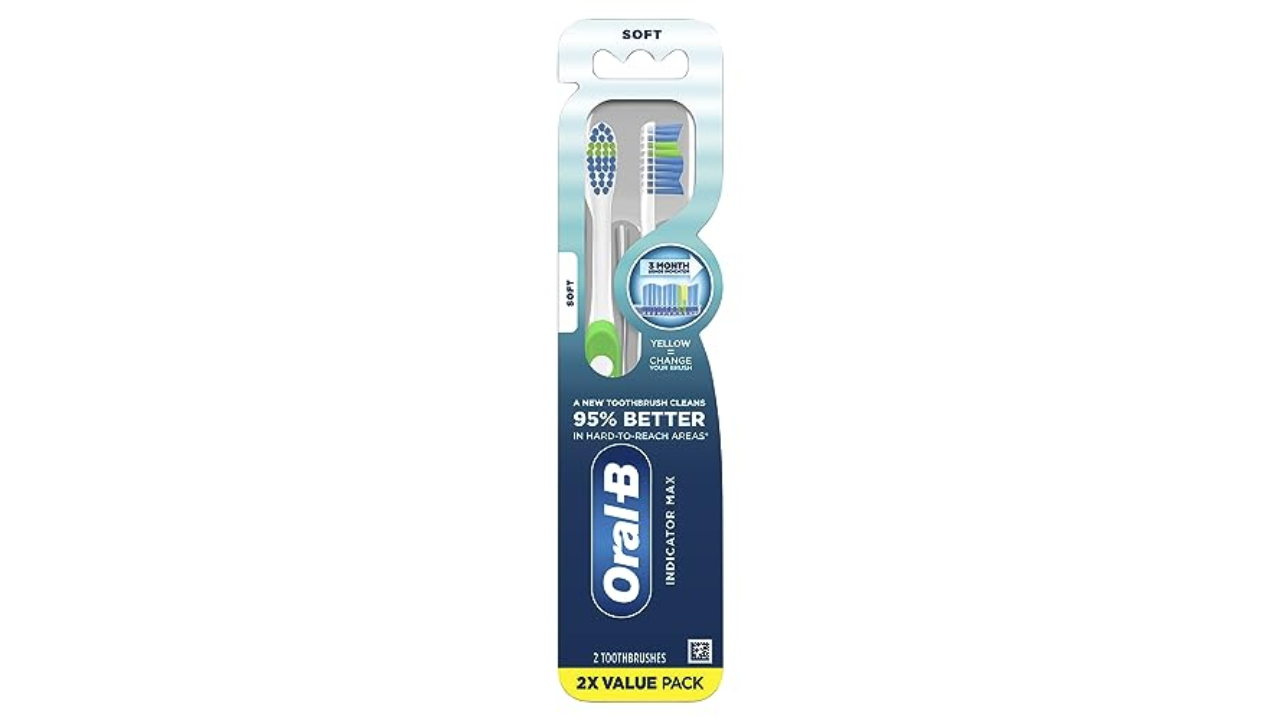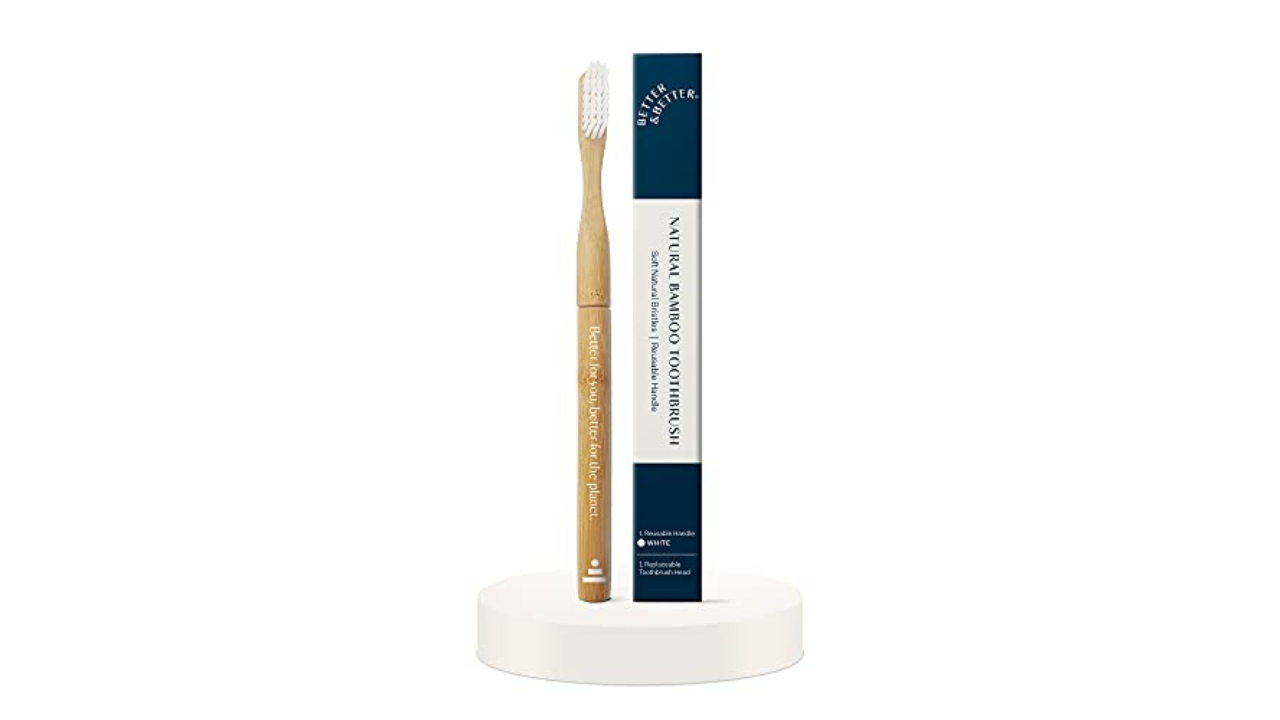We independently evaluate the products we review. When you buy via links on our site, we may receive compensation. Read more about how we vet products and deals.
How often you should replace your toothbrush, according to a dentist
If you can't remember the last time you replaced your toothbrush, you should do it now.
A toothbrush is a daily health essential for keeping your oral health in check. So let’s ask: When was the last time you replaced your toothbrush? If you don’t know, you’re probably overdue for a swap. Yes, there are official guidelines for how often you should be replacing your bristles. And there are some good reasons you should take them seriously. So, how often should you replace your toothbrush? Keep reading for the answer, along with some expert tips.
The American Dental Association (ADA) — which advises brushing your teeth two times a day for two minutes each time — suggests replacing your toothbrush every three to four months or more often if the bristles are “visibly matted or frayed.” That’s about every 12 to 16 weeks, or about four times a year. The association adds that replacing your toothbrush on this schedule is essential because the effectiveness of a brush decreases as the bristles become worn.
“The best rule of thumb is once a quarter,” cosmetic dentist Dr. Victoria Veytsman says. “While it isn’t pleasant to think about, germs and bacteria can build up within your brush’s bristles over time. Without proper replacement, your teeth-brushing, therefore, becomes less effective.”
To increase the longevity and effectiveness of your toothbrush, the ADA says to rinse the toothbrush thoroughly after each use to remove any remaining toothpaste or debris. The Centers for Disease Control and Prevention adds that this is an especially important step to remove bacteria, blood, saliva, oral debris and more during the brushing process.
After a good rinse, the ADA advises storing your toothbrush in an upright position, allowing it to air-dry. Storing a toothbrush in a closed container (yes, even just around the brush head) “promotes microbial growth more so than leaving it exposed to the open air,” according to the association.
All things considered, there are many ways to remind yourself to replace your toothbrush. Some electric toothbrush models alert you after a certain number of uses to replace the brush head, taking out the guesswork. Then, there are indicator bristles on manual toothbrushes that gradually lose color as your toothbrush ages, reminding you it’s time for a swap. But you can also set a calendar reminder or simply write the swap date on your disposable brush to make sure you’re getting the most out of your dental routine.
“Check in at the start of each new season with your gadgets and replace the necessary items, and you’re good to go,” says Veytsman. “Your teeth, gums and dentist will thank you for it!”
Does your toothbrush desperately need a swap out? Check out these options below — some of which can even help you track when to refresh the brush head or the entire toothbrush.
The ultimate electric toothbrush, the Philips Sonicare ExpertClean 7500 is like a dentist in a toothbrush. The model has a sensor in it, alerting you if you are brushing too hard. It also comes with three intensities and four modes, allowing you to tailor your teeth-cleaning. You can track your brushing via an app that alerts you when it’s time to swap your brush head.
More than 8,500 Amazon shoppers give it a five-star rating, and one person called it “the greatest toothbrush I’ve ever owned.”
“I wish I could give it 10 stars,” the reviewer wrote. “I’ve never had a toothbrush clean as thoroughly as this one. My back teeth never seem clean, even with electric brushes. I’ve had to take a pick and manually scrape plaque off them. This one though? They were completely clean and smooth after the first use. Buy this toothbrush!”
A popular toothbrush model, the Oral-B Pro 1000 has a round brush head with innovative crossed bristles for a thorough clean. The brush has pressure sensors to alert you if you’re brushing too hard. Plus, this model has a built-in timer to help you brush for a dentist-recommended two minutes. Though this brush won’t alert you when it’s time to swap out your brush head, you can note your swap date on the disposable brush, or set a calendar alert to remind yourself.
“I’ve used both the Sonicare and the Oral B and while either is a huge step up from manual toothbrushes, I get better checkups with the Oral B,” shared one reviewer. “My cleanings now usually only take about 30 minutes in and out. There's very little tartar that needs to be removed, and my gums are in good shape. I must add, however, that I also use the Waterpik flosser, which I think greatly helps.”
A simple yet effective classic, this budget-friendly toothbrush has soft bristles, which the ADA recommends for brushing. The brush’s blue indicator bristles gradually turn white over time, signaling that it’s time to swap brushes.
“Best toothbrush for sensitive gums,” wrote one five-star reviewer. "I have very sensitive gums and many toothbrushes irritate them. These don’t. After brushing, my teeth are clean and my gums happy!”
“It has four in the pack and if you change it every three months that's a year of toothbrushes for a great price,” added another.
For an eco-conscious toothbrush choice, turn to Better & Better. The sustainable dental brand creates some of the best bamboo toothbrushes on the market. A replaceable head design allows you to replace the portion of your toothbrush that gets all the wear and tear. Simply note your swap date on the brush head with a marker (it won’t wash off the bamboo!), and you’ll be good to go.
“I’m so glad I found this toothbrush,” wrote one happy customer. “The bristles feel great, like a gentle gum massage. I’m always looking for little ways to reduce my plastic waste, so love that it's A.) plastic-free and B.) has a replaceable head. ... I can keep the handle instead of chucking it every three months. Bonus: It looks so nice in my bathroom!"
The reviews quoted above reflect the most recent versions at the time of publication.
If you have Amazon Prime, you’ll get free shipping, of course. Not yet a member? No problem. You can sign up for your free 30-day trial here. (And by the way, those without Prime still get free shipping on orders of $25 or more.)


